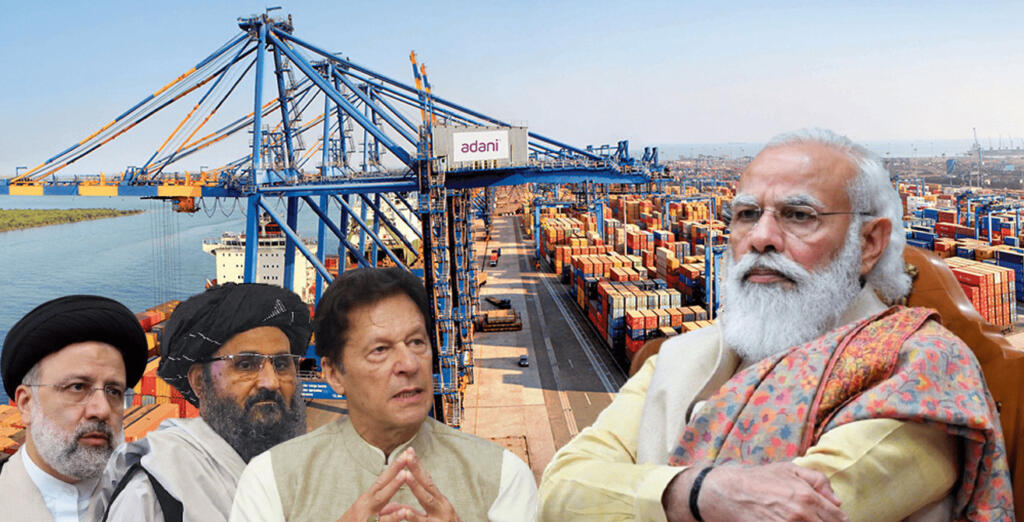It has been over a month since 3,000 kg of heroin was seized from two containers at Mundra port in Kutch, which was one of the biggest such hauls ever in the country. The port, which is operated by the Adani Ports and Special Economic Zone (APSEZ) was dragged into a needless controversy by liberals and the media, who tried to project the drug bust as a major exposé of Gautam Adani’s drug empire – which these forces believe almost definitely exists, and has the blessings of the Modi government. Now, in a tight slap landing squarely on liberal faces, the Adani Group has taken a big step that will silence the naysayers once and for all.
On Monday, the Adani Ports said that the terminals it runs will not handle cargo from Iran, Afghanistan and Pakistan starting November 15. The advisory signed by Subrat Tripathy, CEO of APSEZ (Ports) said that it will apply to all terminals operated by APSEZ and including third party terminals at any APSEZ port till further notice. It said, “Please be informed that with effect from November 15, Adani Ports and Special Economic Zone (APSEZ) will not handle EXIM containerized cargo originating from Iran, Pakistan and Afghanistan.”
The crackdown of Pakistan-Taliban-Iran Drug Nexus
With the resurgence of the Taliban in Afghanistan, we are looking at a new threat of drug trade into India via Afghanistan. The heroine seized at the Mundra port, for example, originated in Afghanistan and was shipped from Iran’s Bandar Abbas Port to Mundra in Gujarat’s Kutch. Afghanistan is the world’s biggest illicit opiate supplier, and the drug trade forms the backbone of the Taliban’s economy.
Pakistan too is deeply involved in supplying drugs across the border into the states of Punjab and Rajasthan, and the Union Territory of Jammu and Kashmir. This is a part of the Pakistan Army and ISI’s strategy to ‘bleed India through a thousand cuts.’ So, it only makes sense now for Adani Ports and Special Economic Zone to put a stop to all cargo coming in from the three Islamic countries, or for that matter, not dealing with any kind of containers associated with these three notorious countries.
What Was the Mundra Drug Bust?
On September 13, around 3,000 kilograms of heroin was seized from two containers at Gujarat’s Mundra port, run by the Adani Group. The heroin was concealed in jumbo bags said to contain unprocessed talc powder. The drug was placed in the lower layers of the bags and then topped with talc stones to avoid detection. The seizure – made during a joint operation by the Customs department and the Directorate of Revenue Intelligence – was valued at around Rs 20,000 crore.
However, Adani Group was soon subjected to criticism from the usual anti-corporate lobby, which argued that the drug bust was a direct incrimination of the collusion between the Modi government and its favourite corporate groups. Following such ridiculous criticism on social media over the drugs haul, the Adani Group had said it had no power to police and examine containers.
Read more: The Adani port Drug leak was fed to the media by the government and more shocks are in the line
In a statement released soon after, the Adani Group said: “No port operator across the country can examine a container. Their role is limited to running the port…APSEZ is a port operator providing services to shipping lines. We have no policing authority over the containers or the millions of tonnes of cargo that pass through the terminals in Mundra or any of our ports.” It added, “We sincerely hope that this statement will put to rest the motivated, malicious and false propaganda being run on social media against the Adani Group.” The Mundra port is India’s largest commercial port and one of the biggest handlers of containerised cargo.
The Adani Group company has about 13 ports and terminals in India. It handles container cargo at Mundra and Hazira in Gujarat; Vizhinjam in Kerala; Kattupalli and Ennore (terminal) in Tamil Nadu; Dighi in Maharashtra; and Krishnapatnam in Andhra. Therefore, it is only natural for some anti-India forces to try and throw mud on the Adani Group, so that India’s trade operations in general somehow take a hit. However, the Adani Group, by refusing to deal with Pakistani, Iranian and Afghani cargo altogether, has conveyed its will to secure India’s interests at all costs.
